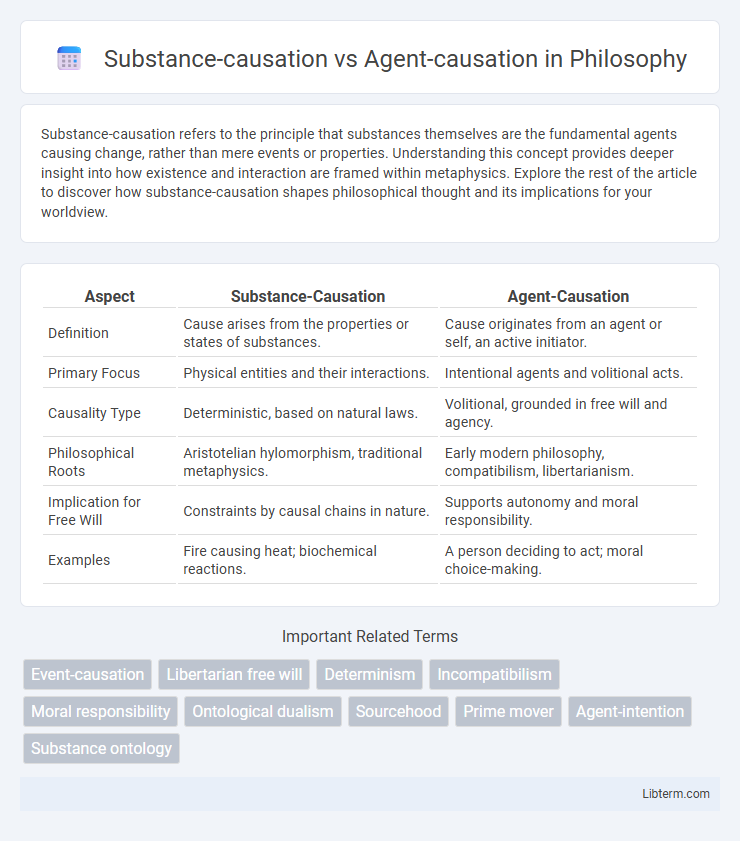Substance-causation refers to the principle that substances themselves are the fundamental agents causing change, rather than mere events or properties. Understanding this concept provides deeper insight into how existence and interaction are framed within metaphysics. Explore the rest of the article to discover how substance-causation shapes philosophical thought and its implications for your worldview.
Table of Comparison
| Aspect | Substance-Causation | Agent-Causation |
|---|---|---|
| Definition | Cause arises from the properties or states of substances. | Cause originates from an agent or self, an active initiator. |
| Primary Focus | Physical entities and their interactions. | Intentional agents and volitional acts. |
| Causality Type | Deterministic, based on natural laws. | Volitional, grounded in free will and agency. |
| Philosophical Roots | Aristotelian hylomorphism, traditional metaphysics. | Early modern philosophy, compatibilism, libertarianism. |
| Implication for Free Will | Constraints by causal chains in nature. | Supports autonomy and moral responsibility. |
| Examples | Fire causing heat; biochemical reactions. | A person deciding to act; moral choice-making. |
Defining Substance-Causation and Agent-Causation
Substance-causation refers to the idea that causality arises from the inherent properties or nature of substances themselves, where one substance causes changes in another through its essential qualities. Agent-causation posits that a conscious agent, as an originator of actions, initiates causal chains based on free will and intentionality, rather than being solely determined by prior events or substances. These two concepts distinguish between causation rooted in material or metaphysical properties (substance) and causation arising from intentional agents (agent).
Historical Origins and Philosophical Background
Substance-causation traces back to Aristotle's metaphysics, where substances inherently possess causal powers shaping events through intrinsic properties. Agent-causation originates from early modern philosophers like Rene Descartes and Thomas Reid, emphasizing the individual's capacity to initiate actions independent of deterministic chains. These philosophical backgrounds highlight the contrast between causation grounded in inherent qualities of entities versus the autonomous exercise of human will.
Key Differences Between Substance-Causation and Agent-Causation
Substance-causation posits that objects or substances themselves possess causal powers that bring about effects, emphasizing the inherent properties of things. Agent-causation argues that agents, or conscious beings, initiate actions independently of deterministic physical processes, highlighting intentionality and free will. The key difference lies in substance-causation attributing causality to the inherent capacities of entities, whereas agent-causation attributes causality to the autonomous initiation by conscious agents.
Major Theories Supporting Substance-Causation
Major theories supporting substance-causation emphasize that entities possess enduring substances that inherently cause their actions and changes, rather than relying on external agents or events. Aristotle's hylomorphic framework posits that form and matter constitute substances, with causation arising from the inherent nature of these substances. Descartes also contributed by arguing for a clear distinction between mind and body substances, attributing causation to the intrinsic qualities of each substance rather than to agent-driven decisions.
Prominent Advocates of Agent-Causation
Prominent advocates of agent-causation include Roderick Chisholm, who argues that agents themselves possess the power to initiate actions independent of prior events, emphasizing personal agency and free will. Thomas Reid also supports agent-causation, contending that individuals are the true originators of their actions, rather than events or substances alone. These philosophers highlight the significance of agents as fundamental causal entities in debates on metaphysical freedom and moral responsibility.
Substance-Causation in Contemporary Metaphysics
Substance-causation in contemporary metaphysics emphasizes the role of enduring entities, or substances, as the primary causes of events, contrasting with agent-causation which highlights agents or persons as causal initiators. This approach aligns with Aristotelian metaphysics, asserting that substances possess inherent causal powers grounded in their essential properties and capacities, independent of external forces. Recent debates focus on how substance-causation accounts for persistence, change, and the metaphysical basis of causality in the natural world, often intersecting with discussions on powers, dispositions, and the ontology of objects.
Agent-Causation and the Problem of Free Will
Agent-causation theory asserts that agents themselves, rather than merely events or states, are the true originators of actions, providing a foundational basis for free will by emphasizing the active role of the self. This framework addresses the Problem of Free Will by proposing that agents possess the power to initiate causal chains independently of deterministic natural laws, thereby supporting genuine moral responsibility. Critics challenge agent-causation by questioning how agents can exert causal influence without violating physical causality or falling into metaphysical obscurity, fueling ongoing philosophical debate.
Criticisms and Challenges of Each Causation Model
Substance-causation faces criticism for its reliance on metaphysical substances whose existence is difficult to empirically verify, raising challenges in explaining how inherent properties cause effects without circular reasoning. Agent-causation is challenged by the problem of explaining how an immaterial agent initiates causal chains without violating physical laws, leading to debates on free will and determinism. Both models struggle with providing clear criteria for causal interaction, resulting in ongoing philosophical debates about the nature of causality and the compatibility of these frameworks with contemporary scientific understanding.
Implications for Moral Responsibility
Substance-causation attributes actions to the properties or states of entities, emphasizing deterministic processes that can challenge traditional notions of free will and moral responsibility. Agent-causation posits that agents themselves have the power to initiate actions independently of prior causal chains, supporting the foundation for holding individuals morally accountable. The acceptance of agent-causation reinforces the belief in personal autonomy and justifies praise or blame within ethical frameworks.
Future Directions in Causation Debate
Future directions in the causation debate emphasize integrating neuroscientific insights with philosophical analysis to clarify substance-causation and agent-causation distinctions. Advances in cognitive science could illuminate how agents exert causal influence beyond mere physical interactions, refining agent-causation theories. Computational models and interdisciplinary approaches may further reconcile mechanistic explanations with autonomous causal agency, fostering a more comprehensive understanding of causation.
Substance-causation Infographic

 libterm.com
libterm.com